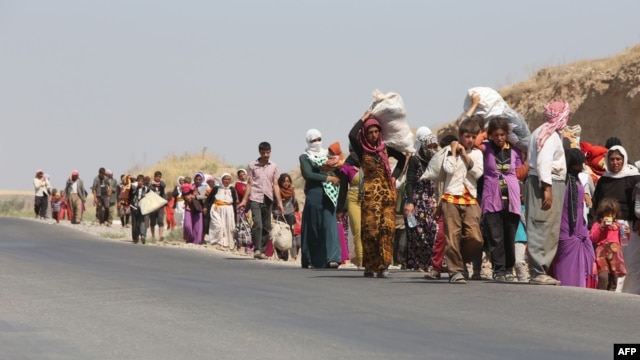Iraq: Obama says 'siege' of Sinjar mountain broken
| Publisher | Radio Free Europe/Radio Liberty |
| Publication Date | 14 August 2014 |
| Cite as | Radio Free Europe/Radio Liberty, Iraq: Obama says 'siege' of Sinjar mountain broken, 14 August 2014, available at: https://www.refworld.org/docid/54003ef914.html [accessed 21 May 2023] |
| Disclaimer | This is not a UNHCR publication. UNHCR is not responsible for, nor does it necessarily endorse, its content. Any views expressed are solely those of the author or publisher and do not necessarily reflect those of UNHCR, the United Nations or its Member States. |
August 14, 2014
 Displaced Iraqi families from the Yazidi community cross the Iraqi-Syrian border at the Fishkhabur crossing in northern Iraq on August 13.
Displaced Iraqi families from the Yazidi community cross the Iraqi-Syrian border at the Fishkhabur crossing in northern Iraq on August 13.
U.S. President Barack Obama said the situation for Yazidis on Sinjar Mountain in northern Iraq has greatly improved since last week when he ordered air strikes to relieve pressure on the refugees fleeing militants of the Islamic State.
At a short press briefing on August 14, Obama said the U.S. bombing of positions held by Islamic State militants has "broken the siege."
He also said a small team of U.S. advisors were sent to the Sinjar area on August 13 to assess the situation there.
Obama said he does not expect the aid operation in northern Iraq to continue for much longer but says the U.S. will continue to take necessary measures, including air strikes, to protect Americans in Iraq.
U.S. officials said earlier on August 14 that there were still approximately 4,500 people on Sinjar Mountain, some of whom were herders who lived there and did not require evacuation.
Meanwhile, Germany is set to fly 35 tons of humanitarian aid to northern Iraq on August 15, as Berlin said it was also considering military assistance to the embattled country.
German media quoted Defense Minister Ursula von der Leyen as saying Berlin plans to send drinking water, food, blankets, and medicine.
The supplies will be flown by German air force planes to the Kurdish city of Irbil to be handed over to United Nations agencies.
The minister said Germany may also send nonlethal military hardware such as armored vehicles, helmets, security vests, and night-vision gear.
Many prominent lawmakers have demanded Germany also provide military assistance to embattled Iraqi state and Kurdish forces to fight against advancing Islamic State militants.
The minister said "weapons are already being delivered by other nations; we are examining at present what other military equipment we can send."
Based on reporting by AFP and AP
Link to original story on RFE/RL website
